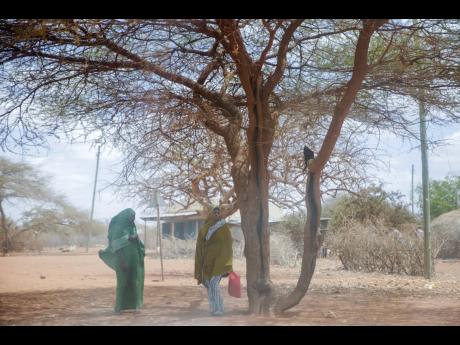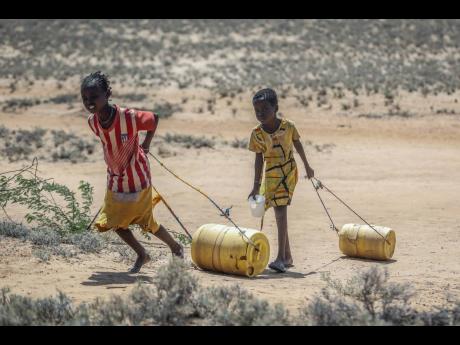Michael Taylor | Tackling climate change makes sense
If you ever wanted a good reason for supporting efforts to tackle climate change, check your finances – or the lack of it – over the last two months. It should make you a strong advocate for climate action.
Climate change has been affecting us personally for a long time. It has been steadily eroding our quality of life through its impact on food security, water availability, economic competitiveness, and health and wellbeing, to name a few areas. Yet, some of us, though acknowledging the seriousness of the challenge, have been slow to take it on as a personal issue; instead seeing it as a good cause, but not an immediate one.
The personal urgency is not there when you have an AC in your bedroom and a black tank on your roof and when you don’t have to wake early to catch water, bathe from a bucket, or sit outside as your best option to escape the oppressive heat from the zinc or slab roof of your one-room house, shared by five other family members in your densely packed, tree-denuded inner-city community.
But these last few months might just be the thing to change attitudes and rally action. For, yes, it has been hot - record-breaking and unbearably hot - and even if you hadn’t realised it, it has been costing you individually in real dollars and cents.
IMPACTED
Here are five ways climate change has very likely impacted your pocket (and mine) this summer.
1. Your light bill has gone up! In the middle of July JPS recorded its highest ever demand for electricity. The analysis as to why is yet to be done, but is likely not needed for you and me, given the extent to which we have used cooling devices especially at night. Unless you are completely reliant on renewable energy, you would have seen increasingly higher electricity bills over the past two months. Unfortunately, climate outlooks support this trend continuing for a little while longer this year.
2. Your grocery expenditure has gone up! It could be that you made extra trips to the grocery store this month because the water or drinks finished quicker than anticipated. It could be that you bought more drinks than usual with children home for vacation and elderly relatives to care for. (Here we must be careful about nutrient substitution as you swap out buying food stuff for things to drink). It could also be that you paid higher prices for local items due to increased climate-induced manufacturing costs (electricity, water, spoilage, loss); or higher prices for scarce local produce (agriculture is struggling this summer); or higher prices for the imported alternatives. Whatever the cause, it is likely you have spent more this summer at your usual grocery shop.
3. Your water bill has gone up! Though you may not be getting water in your pipes, the essential nature of water means that you are still spending for it. You are likely doing one or all of the following - buying lots of water privately for drinking and other purposes; filling many large containers from NWC sources when water does becomes available; using more water than usual to prevent the house plants or kitchen gardens from completely dying; doing more loads of laundry as the sweat-drenched clothes can’t be hung up for a second wear; or taking the chance and still washing your car notwithstanding the NWC prohibition because it is essential to your livelihood and the dry dusty conditions force you to do so.
4. Your doctor’s bill has gone up! If you have small children or older relatives for whom you must care you are likely spending more on their asthma or heart medication, or to see your private doctor or join the lines at public health facilities. Demand is up for nebulisation and other respiratory treatments, and for emergency medical care related to heat-induced dizziness, nausea, and/or disorientation among the elderly. There are also the unfactored medical costs of the emotionally and physically weary caregivers like yourselves, over the last few months.
5. Your disposable income has gone down! Climate change has eaten into that portion of your monthly salary that you would have otherwise spent on you or your family. In addition to the increased electricity, water, grocery, and doctor’s expenses reducing ‘what’s left’ for the fixed income earner, climate change has likely also made you draw down on your ‘savings’ or take on ‘unanticipated debt’ this summer.
Your monthly disposable income was ‘climate-ambushed’ if, for example, you, in desperation bought an AC or fan or two and paid the associated installation costs, made extra trips to the gas station as AC is a must on the road; spontaneously packed up the family for a trip to a public park, Devon House, Harmony Beach, or more luxurious options for those able, because both the heat and the ‘heat-induced’ miserableness became unbearable; lost a day’s pay to look after a heat-challenged relative; sacrificed a half-day’s work because your outdoor job cannot be accomplished between 11 am and 3 pm; spent more for a usual service and learned that the increase was due to higher operational overheads, such as light and water… and the list could go on.
REALITY OF CLIMATE CHANGE
This summer’s heat has brought home the reality of climate change to everyone. According to science, more can be expected in the coming years – not just more hot days and nights, but also erratic rainfall regimes, higher sea levels, too warm oceans, longer droughts, and intense hurricanes. This summer teaches us that the climate is changing faster than anticipated and leaving no one unimpacted. If it is now impacting us in perceptible ways, what must it be doing to those who were feeling it all along? For them, this summer’s heat must be an unimaginable burden.
By ‘them’ I mean the homeless, health-challenged, the non-human natural world, outdoors workers, farmers, fishermen, and the poor, among others. This summer, then, teaches us about the climate non-negotiables, e.g., renewable energy for cooling; expanded social protection measures for the most vulnerable; equitable water solutions; adaptation plans for climate sensitive livelihoods, an occupational safety and health policy which incorporates climate factors; a robust innovation ecosystem to spur innovative, contextual solutions; disaster management with an expanded view on what constitutes a disaster; funding for research and data gathering to enable informed decision making; new climate-financing mechanisms; new climate-smart building and transportation solutions; a climate-aware national budget; regulations, enforcement and environment-related legal structures.
It’s time to have everybody onboard as small islands demand change while change is still possible. If nothing else, this summer has taught us that down to the individual level tackling climate change indeed makes sense.
Professor Michael Taylor is dean of the Faculty of Science and Technology; codirects the Climate Studies Group, Mona at The University of the West Indies. Send feedback columns@gleanerjm.com



